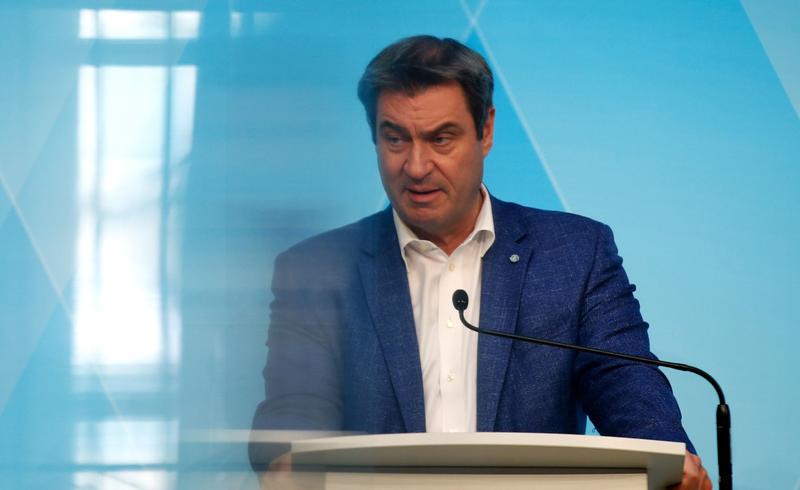 This undated photo shows Bavarian Premier Markus Soeder. (PHOTO / BLOOMBERG)
This undated photo shows Bavarian Premier Markus Soeder. (PHOTO / BLOOMBERG)
Bavarian Premier Markus Soeder presented himself as a force for change who can revive the fortunes of Germany’s conservatives as he made his bid to follow Chancellor Angela Merkel at the top of the bloc’s election ticket.
Angela Merkel’s Christian Democratic Union and the Bavarian sister party have seen their poll numbers tumble over recent weeks amid mounting concern over the govt’s handling of the pandemic
His rival for the candidacy in September’s federal vote, Armin Laschet, said that Soeder changes his views a little too easily, accusing him of opportunism and lacking principle, according to officials present at a private meeting with lawmakers.
The battle to claim the mantel of Merkel’s successor is going down to the wire with the two contenders exchanging increasingly barbed attacks that have alarmed senior officials from their bloc. Both said the matter must be settled by Friday.
ALSO READ: German race to replace Merkel tightens
“Armin and I have agreed that we will make a final discussion this week,” Soeder told reporters afterward. “We have to let the result of this discussion sink in a bit.”
Merkel’s Christian Democratic Union and the Bavarian sister party led by Soeder have seen their poll numbers tumble over recent weeks amid mounting concern over the government’s handling of the coronavirus pandemic. Merkel herself is worried that the spectacle of a public brawl between the bloc’s two leading figures will do further damage to its standing with voters, according to a person familiar with her thinking.
After initially balking at the prospect of a direct clash, Laschet, the leader of the much larger CDU, was goaded into joining Tuesday’s meeting after Soeder vowed on Monday to make his pitch directly to the alliance’s parliamentary caucus. On Wednesday night, Soeder will appear on a prime time German talkshow, highlighting his potential appeal to voters.
Laschet has precedent on his side - the Munich-based CSU has never elected a chancellor and the CDU almost always provides the bloc’s candidate - as well as the organizational muscle of the CDU hierarchy. But he’s failed to strike a chord with voters.
“We need unity quickly,” he said as he left the meeting. “This was a good discussion which we will have to factor into our decision.”

Grassroots revolt
Soeder is betting that CDU lawmakers worried about losing their seats can be persuaded to back his claim instead of their boss’s and several spoke out to support him at the meeting. One said that members in his district have said they won’t campaign for Laschet and read out emails from some who threatened to leave the party if he became candidate, officials said.
Soeder also came in for criticism, with one CDU lawmaker saying he has no backbone and attacking him for flip-flopping.
In his speech to the caucus, Soeder argued that the CDU/CSU can’t afford to ignore the polling numbers that are projecting the worst federal election result in their history and business as usual will no longer work, officials present said. He pitched himself as a candidate who can connect with a new generation of voters via television and social media.
Laschet pointed to Soeder’s track record of imitating the anti-immigration stance of the Alternative for Germany before switching to attack the nationalists when it was politically expedient, sarcastically congratulating his opponent for the U-turn.
“You have really done a good job there,” Laschet said, according to one of the officials.
READ MORE: Merkel party unanimously backs Laschet's bid for chancellor
While the CDU/CSU’s 245 Bundestag lawmakers have no formal role in picking a chancellor candidate, a preference for one of them could tip the balance in an informal process.
Caucus leader Ralph Brinkhaus said going into the closed-door meeting that he wants the candidates to reach an agreement between themselves and the lawmakers won’t be making any recommendation as such.
“It doesn’t make any sense that a decision is made in dispute or in opposition to one another,” he said. “We want the party chiefs to agree so that we can then jointly prepare for the campaign as soon as possible.”


